On 27 September, the Global Leaders’ Meeting on Gender Equality and Women’s Empowerment: A Commitment to Action, co-organized by UN Women and the Chinese Government, resulted in unprecedented political support at the highest level for our agenda. Governments have made concrete national commitments to ensure women and girls can reach their full potential by 2030. Below are excerpts from the statements of the Latin America and the Caribbean Heads of Government/State.
Argentina: President Cristina Fernandez
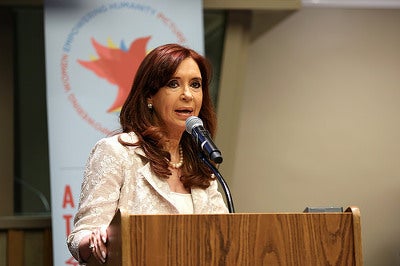
Cristina Fernández. Photo: UN Women/Ryan Brown
“In Argentina we have developed a strong process of social inclusion which has brought about more equal opportunities for women. We have active programmes and policies such as universal benefits for pregnancies, for children and education all the way up to university. This has made it possible together with gender equality laws to protect women. … Even in more developed societies, there continues to be gender inequality with respect to access to political decision-making. … We need to break cultural barriers which have considered women for centuries to be an inferior or less intelligent being. And that is why I think that policies must also be aimed at [transforming] culture, at empowering women not only as as a matter of obligation under conventions or international treaties, but that there be a deep conviction in the hearts of men and of women… to bring down taboos and prejudices against us. … In Argentina we have achieved a high degree of equality that should also be extended to youth and other sectors of society.”
Brazil: President Dilma Rousseff
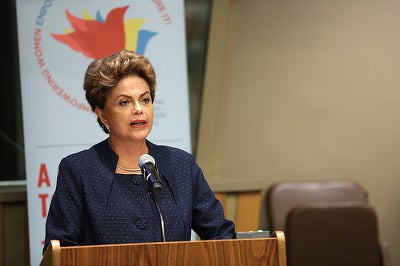
Brazil: President Dilma Rousseff. Photo: UN Women/Ryan Brown
On behalf of the Brazilian Government I bring you a message of unwavering and firm commitment to implementing the Beijing Platform for Action. [We commit] to ensuring coverage of all women in situations of violence, …further [engaging] in actions [for] women in policies, further [ensuring] women's development at all educational levels…, strengthening maternal health care…and assistance to girls.”
Chile: President Michelle Bachelet
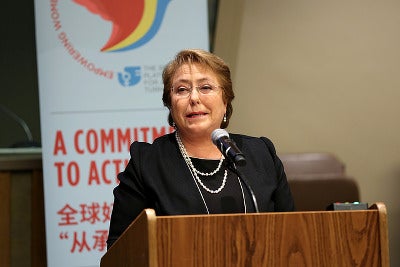
Chile: President Michelle Bachelet. Photo: UN Women/Ryan Brown
“The Chilean Government … is implementing a Labour Training Programme. We hope to train 300,000 women for highly skilled jobs, together with our programmes to empower entrepreneurs. When it comes to collective negotiation, we want to [enhance the] ability of women to negotiate as workers, including organizations representing the labour force in such a way that the gender focus can reduce the wage gap between men and women. … We implemented a national action plan against violence against women and we have more centres to welcome women who are the victims of abuse. We’ve also started programmes to train community leaders and government officials to prevent and halt violence against women. We also have a bill [to decriminalize] abortion when the mother’s life is in danger, or the fetus might be seriously compromised after birth, [or for] pregnancy as a result of rape. … But for gender equality to be effective, we also have to look at the decision-making area, in social and political spheres. The new Chilean electoral system, which we approved in January this year, for the first time has a quota system whereby at least 40 per cent of the candidates standing for Parliament must be women. We have problems with people complying, so we have put forward two incentives: firstly any party which does not have 40 per cent of women standing cannot register any candidate; secondly, parties [presenting] women [candidates] will receive economic incentives … to comply with the law. ... My Government has also taken steps so that by 2018 we will have 40 per cent of women directing public enterprises. We’re also looking [to ensure there] is equality, empowerment and solidarity between spouses.”
Colombia commits to strengthen gender equality policies, eliminate gender disparities in education, reduce female unemployment, implement a plan on ending gender-based violence
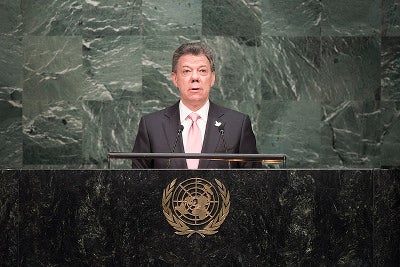
Juan Manuel Santos Calderón, President of Colombia. Photo:UN Photo/Mark Garten
Colombia commits to: strengthen the institutions and gender equality policies for the promotion, respect, protection and guarantee of the rights of all women with special attention to the most vulnerable, including the victims of conflict and women living in rural areas; to continue working to eliminate gender disparities in education and to guarantee equal access for women to all levels of schooling and training; to undertake all necessary efforts so that all boys and girls have access to quality early childhood care and development services and pre-school education; to continue to strengthen and promote the economic empowerment and autonomy of women and increase efforts to reduce the female unemployment rate from 11.9 per cent to 10.5 per cent; to continue working to transform work structures in companies, seeking to ensure that they not only generate employment and wealth for society at large but also serve as an equal work environment and contribute to creating a fairer society; to strengthen democratic representation and electoral participation and increase the full and effective participation of women and equal leadership opportunities at all levels of decision-making; to adopt additional measures to eliminate all forms of discrimination and violence against women and girls in private and public spheres… In 2015, the country approved a law against femicide. … Colombia pledges to create a national mechanism of coordination across sectors and institutions to create a global approach to gender violence, including prevention, care, protection, sanction and eradication; to establish and strengthen the necessary mechanisms and measures for the promotion, protection, full exercise and guarantee of sexual and reproductive rights; to strengthen women’s capacity to make decisions as to their bodies, sexuality and reproduction; to work towards the construction of new masculinities; and to strengthen the processes of planning, monitoring, assessing and creating proposals which are gender-sensitive.
Costa Rica: President Luis Guillermo Solis Rivera
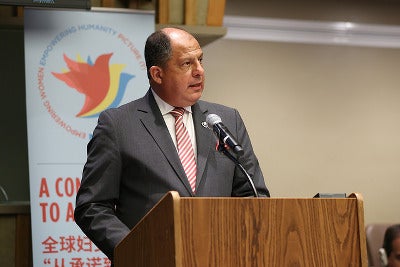
Costa Rica: President Luis Guillermo Solis Rivera. Photo: UN Women/Ryan Brown
"We commit ourselves to place at the centre of public policy the shared responsibility for caregiving as an engine for cultural change, expanding and diversifying its alternatives; to promote instruments that generate scientific evidence on the gaps in gender data that result in barriers to [using] women’s talent; [to] create jobs through affirmative action for women through public/private partnerships; [to] establish job creation programmes with affirmative action…specifically to benefit youth, women and persons with disabilities; [to] create and implement a seal of quality to check and certify gender equality in businesses and institutions; [to] guarantee the effective implementation of inspections in places of work; [to] work within the framework of the UN tirelessly together with our partners and elders and other groups that will facilitate this process; and [to] achieve the objective [that] would give content to the promises and commitments made here, which would be the election of a women as the next Secretary-General of the UN."
Cuba: President Raúl Castro
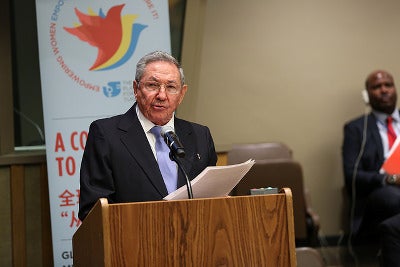
Cuba: President Raúl Castro. Photo: UN Women/Ryan Brown
“Today Cuban women’s life expectancy is 80.55 years of age. The direct maternal mortality rate is…one of the lowest in the world. They make up 66.8 per cent of the labour force…. Nevertheless, we still have much to do. We need to continue to work to change cultural patterns so that women and men can share the care of their…family, and we must continue to increase the number of women in government.”
Dominican Republic: President Danilo Medina Sanchez
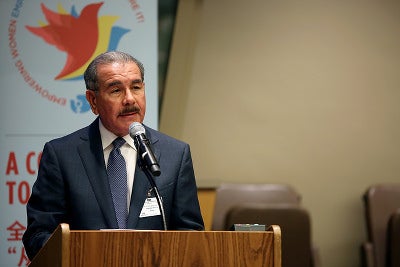
Dominican Republic: President Danilo Medina Sanchez. Photo: UN Women/Sarah Stacke
“We have achieved some important targets, for example…in education. We are also developing a plan for early childhood. This is helping hundreds of free community and other centres [that are] helping women every day. We are also promoting funding [for] women. Seventy per cent of loans granted by [the] solidarity bank go to women…to set up microenterprises [and] women’s cooperatives [to] increase their income by working together. …We want to work to prevent women from...not achieving empowerment because of economic factors…[and] we want to eradicate violence against women. We have a political resolve to continue [to achieve] the well-being of our people…and a more just society.”
Guyana: President David Granger
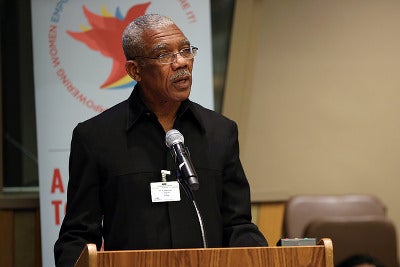
Guyana: President David Granger. Photo: UN Women/Sarah Stacke
“Guyana has long implemented legislative measures to ensure equitable access of women to the highest offices and to ensure that at the level of the working class, women can enjoy equal wages for equal work. We seek to build a country in which women and girls can be protected from abuse, such as trafficking in persons, domestic violence, and workplace hazards. Guyana continues to make great strides towards achievement of the internationally agreed development goals and objectives relative to gender equality and empowerment of women, particularly in the areas of mainstreaming a gender perspective in policy development and programmes enhancing education and training opportunities for girls, [as well as] increasing the participation of women in leadership positions and decision-making circles, and support for Goal number 5 of the Sustainable Development Goals.”
Honduras: President Juan Orlando Hernandez
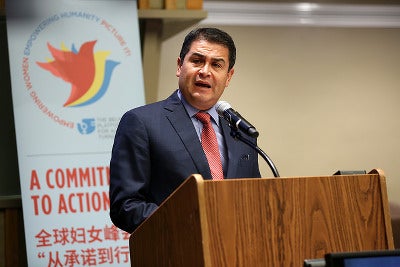
Honduras: President Juan Orlando Hernandez. Photo: UN Women/Ryan Brown
“Honduras has made significant inroads in gender equality...we are improving living conditions and housing. Proactive state employment programs...have always been conducted within…strict criteria for gender equality. We have announced a firm strategy to counter [increases in family violence and femicide], which we believe [is] having a great impact…. Honduras has implemented policies to address crime and violence in general...we've seen therefore effects on the death rate among women.... I personally am interested in implementing a policy for gender mainstreaming…. We have made [reducing maternal mortality] one of the main planks in the reform of our health system. And we're also looking at… ensuring gender mainstreaming in planning and effective operations….”
Mexico: President Enrique Peña Nieto
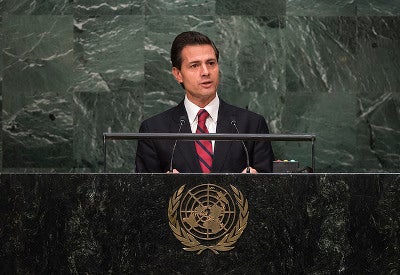
Enrique Peña Nieto, President of the United Mexican States. Photo: UN
“We are again taking a transcendental step in mainstreaming a gender perspective [guiding] the 2030 Agenda for Sustainable Development. It is a great satisfaction to have achieved the incorporation of this approach in the document that will guide international efforts on development. In keeping with this vision, Mexico included the gender perspective at the core of our national development plan and implemented political reform which commits parties to ensuring that 50 per cent of candidates to legislative seats be for women. Thanks to this measure today, the recently elected Chamber of Deputies in Mexico is made up of 42 per cent women. To continue to move forward toward greater equality, the Government of Mexico will implement three important measures: We will have, at the ministerial level, the coordination of the work of our national activity on equality of men and women; … we will promote more shared responsibility between men and women to improve on the distribution of work in the home; [and] we will scale up actions to reduce adolescent pregnancies and to reduce maternal mortality.”
Panama: Vice President Isabel Saint Malo
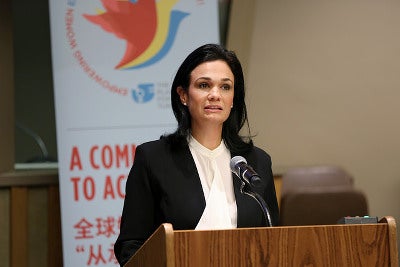
Panama: Vice President Isabel Saint Malo. Photo: UN Women/Ryan Brown
“We are working to strengthen our electoral system [in terms of] women’s representation…. Panama will take the steps necessary to promote the rights of women and girls. In the Government of Panama we are determined to [make] headway… Panama is also committed to eradicating violence against women.”
Paraguay commits to boost resources for rural women and improve coordinated action to prevent violence against women and punish perpetrators
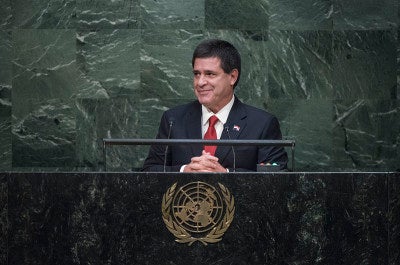
Paraguay: Horacio Cortés. UN Photo/Amanda Voisard
In a speech prepared in the context of the Global Leaders’ Meeting, President Horacio Cartes said: “I make a firm commitment to strengthening the actions needed to speed up the advancement of real and effective equality between men and women in my country in accordance with the national regulatory framework.” He outlined the country’s priorities for increasing women’s economic empowerment, through significant steps to include rural women with scant resources in public programmes by getting them into productive projects, providing them with access to credit and training, and enacting the Public Policy Law for Rural Women. He committed to boost the implementation of this Law with as many resources as possible and to increase the number of rural women engaged in agricultural work who are beneficiaries of agrarian extension programmes. To preventing and punish gender-based violence, he said he is doubling political support to approve the Draft Law for Comprehensive Protection for Women against any kind of Violence, now being discussed in the National Congress, and committed to improving the coordinated actions among the different institutions to prevent any danger, help women facing violence and trafficking, and punish perpetrators. To improve women’s public and political participation, through the governing mechanism for public policies for gender equality, he said Paraguay will promote legislative reform aimed at democratic parity, and political agreements to increase women’s presence in decision-making positions and in positions of power.
The United States of America to work towards a world where every woman and girl can enjoy their rights and freedoms
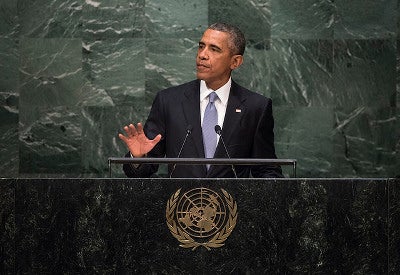
Barack Obama, President of the United States of America. Photo: UN Photo/Cia Pak
In a statement for the 20th anniversary of the Fourth World Conference on Women, US President Barack Obama recommitted his country to the basic principle affirmed in Beijing: “[w]omen's empowerment and their full participation on the basis of equality in all spheres of society, including participation in the decision-making process and access to power, are fundamental for the achievement of equality, development and peace.” He said: “Within the United States, we are taking steps to support working families, encourage women and girls to pursue careers in the STEM fields, and provide additional opportunities for women entrepreneurs. But we know that much work remains … my Administration continues to work to advance the empowerment and education of women and girls here and abroad. It's why we are dedicating additional resources to address violence against women and girls. It's why we are investing in job training and apprenticeships to help women earn better-paying jobs. It is why we launched ‘Let Girls Learn’, to address the challenges adolescent girls around the world face in enrolling, completing and succeeding in school. And it is why my Administration's Stand with Civil Society initiative is supporting the right of women and all people around the world to work peacefully for the betterment of their societies without fear that their rights and freedoms will be unjustly abridged. Today, we renew our resolve to work tirelessly towards a world where every woman and girl can enjoy the rights and freedoms that are her birthright.”
See more at: https://beijing20.unwomen.org/en/step-it-up/commitments#sthash.u9DtXqnf.dpuf











